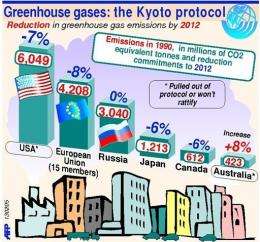Climate: What's to become of the Kyoto Protocol?

Whether to tweak, bolster or bury the Kyoto Protocol -- the only binding global agreement for curbing greenhouse gases -- has become a red-hot issue as UN negotiators in Bangkok try to lay the groundwork for a successor treaty.
The flare-up has erupted only two months before the December 7-18 UN conference tasked with delivering a planet-saving climate deal. It pits rich nations against poor and raises fundamental questions about the architecture of any future treaty.
"Do we keep totally separate regimes for the two constituencies, or do we start building what the United States calls a continuum that includes both -- that's the big question," said Claire Parker, a consultant for IUCN, an intergovernmental environmental group.
The two-week session in Bangkok, attended by delegates from 180 nations, ends Friday.
All parties agree that the central aim must be to radically slash carbon pollution in order to forestall climate catastrophe.
But how to share out that task, and who should foot the bill, remain highly contentious.
Framed in 1997 and put into force in 2005, Kyoto legally binds 37 industrialised countries to cut greenhouse gas output by a total of more than five percent before 2012, compared to 1990 levels. The efforts demanded from each country varies.
The United States signed the protocol but never ratified it, objecting to the fact that it did not cover major emerging economies such as China, which has since become the world's top carbon polluter.
Even with a new administration, the US position has not changed. "We are not going to ratify the Kyoto Protocol. That is out," US climate negotiator Jonathan Pershing told AFP on Wednesday.
What the United States favours instead, he said, is a new legal framework in which all countries would lay out their carbon-curbing schemes, and agree that they be measured and verified by outside experts.
"We are not asking (developing) countries to commit to the outcome. We are asking them to commit to the action itself," Pershing said earlier in a press conference. "We have to commit to the outcome. There is a big difference."
China, India and dozens of developing countries say this approach is unfair.
"This is a problem that has been created by a small minority of countries. The vast majority of the developing countries are victims," China's climate change ambassador Yu Qingtai told journalists Wednesday.
Kyoto spells out that historical responsibility, he said.
And until rich nations make new commitments to cut CO2 pollution and put money on the table to help poor countries fight global warming and cope with its consequences, Kyoto is the only guarantee the developing world has, he argued.
"Keeping Kyoto is non-negotiable," Quamrul Islam Chowdhury, a delegate from Bangladesh, told journalists.
The European Union has said it supports strengthening Kyoto, but created an uproar here this week in suggesting that its major provisions could be imported into a new framework.
"I think they have seen that there will not be a regime unless they move in that direction," said Parker.
Emmanuel Guerin, an analyst at the Institute for Sustainable Development and International Relations in France, also thinks that Kyoto's days are numbered.
"The Kyoto process as such, with its provisions and its name, is probably dead because the United States will never ratify it and we need their participation," he told AFP.
For Dessima Williams, chief negotiator for Grenada and head of the Association of Small Island States (AOSIS), the debate over Kyoto is a distraction from the core issues.
"Right now architecture is putting the cart before the horse. The real issue is, we need rigorous and stringent commitments on greenhouse gas reductions," she said.
(c) 2009 AFP
















